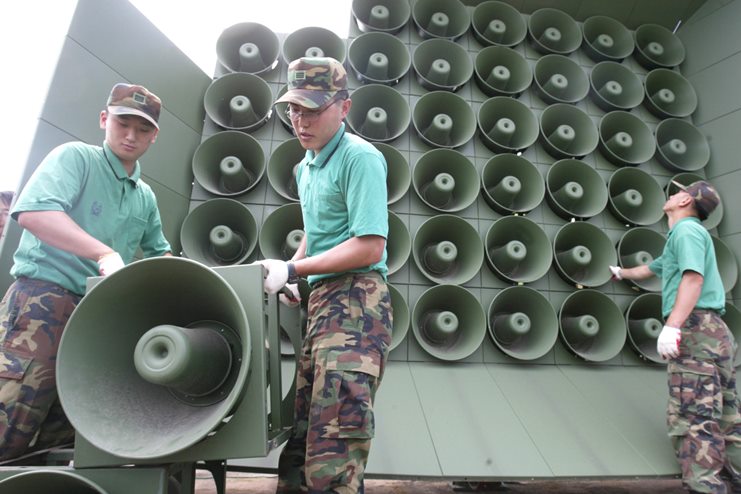 On June 9, 2024, South Korea decided during an emergency National Security Council meeting on June 9 to install loudspeakers along the inter-Korean border and restart broadcasts to North Korea. The photo shows soldiers dismantling a loudspeaker in the central part of the inter-Korean border in June 2004. (Yonhap)
On June 9, 2024, South Korea decided during an emergency National Security Council meeting on June 9 to install loudspeakers along the inter-Korean border and restart broadcasts to North Korea. The photo shows soldiers dismantling a loudspeaker in the central part of the inter-Korean border in June 2004. (Yonhap)North Korea’s decision to stop broadcasting propaganda toward the South isn’t a step back—it’s part of a new, more sophisticated strategy.
The country is preparing more precise and effective psychological warfare operations after reframing inter-Korean relations as “two hostile nations in a state of combat,” according to a Daily NK source in North Korea recently.
The decision to suspend broadcasts came directly from Kim Jong Un himself, with coordination between the ruling party’s politburo and the State Affairs Commission’s strategic policy bureau. This wasn’t a working-level decision but an order from the supreme leader.
In late December 2023, Kim called for a fundamental change in the party’s approach toward the South. “Relations between North and South Korea are no longer those of the same peoples but have become those of two hostile countries or countries in a state of combat,” he said, according to the Korean Central News Agency.
Since North Korea now views relations as “state-to-state”—specifically between hostile states—rather than ties between the same people working toward reconciliation and reunification, its leaders have decided their psychological warfare methods must change accordingly.
“Psychological operations are undergoing a full-scale transition into a ‘means of war,’ given that the leader has stopped even mentioning how we’re the same people,” the source explained. “There’s a strong trend toward scrapping old methods and using new tactics and strategies to unnerve the other side.”
“Because loudspeaker broadcasts are expensive to maintain and have limited effectiveness, the authorities are preparing to restart psychological operations in new ways by redirecting those resources,” the source said. “Other departments, like the Reconnaissance General Bureau, are now being tasked with psychological operations.”
A complete shift in approach
This trend was clear in a recent statement by Kim Yo Jong, Kim Jong Un’s powerful sister and deputy department director.
In a July 28th statement published by KCNA, Kim Yo Jong said, “No matter how desperately the Lee Jae Myung government may try to imitate fellow countrymen and pretend they do righteous things to attract our attention and receive international attention, there can be no change in our state’s understanding of the enemy.”
Even regarding South Korea’s suspension of broadcasts toward the North, Kim called it “nothing but a reversible turning back of what they should not have done in the first place” and “not work worthy of appreciation.”
These statements show that North Korea has completely shifted to viewing relations with the South as “hostile.”
“This isn’t just rhetorical change. Inside North Korea, there are many calls to reorganize psychological operations against South Korea as against a ‘particular foreign nation,’” the source said. “The broadcast methods, content, and even the department in charge will all change.”
Some analysts suggest the very suspension of psychological warfare broadcasts is itself advanced psychological warfare. The strategy aims to make South Korea believe tensions have lessened, lowering Seoul’s guard and encouraging conciliatory responses—North Korea may have predicted the South Korean government would suspend its own broadcasts.
“It’s a clever strategy to prepare for stronger confrontation while getting the other side to take a break,” the source said. “However, inside North Korea, they maintain a confrontational framework and have already begun testing and developing more precise and comprehensive psychological warfare methods.”
North Korea has started reorganizing its psychological warfare formations before the Ninth Party Congress. Internal policy calls for preparing new forms of offensive action against the South by strategically redeploying funds and personnel and strengthening information warfare.
The country has also internally crafted scenarios to immediately restart psychological warfare if South Korea strengthens its combined military exercises with the United States.
